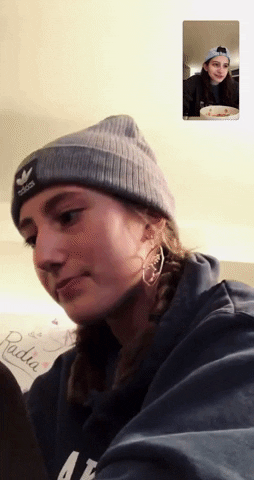(I Can’t Get No) Human Interaction: Tips for Maintaining Physical and Mental Health During the COVID-19 Pandemic
How Bronx Science students are coping as we head into the second year of life during the COVID-19 pandemic.

“It’s not optimal, but until the weather improves, I’d rather we saw each other remotely than not at all,” says Elliott ’21, who has known Shah ’21 since elementary school.
Stop drinking so much coffee, go to sleep earlier, eat your vegetables, get off your phone, do your homework, go outside — we have heard it all before. After the revised remote learning plan was implemented this past September 2020, it seemed as though students would only benefit — we would be able to learn from our teachers and have discussions with our classmates in real-time, which would balance out the asynchronous work we had to do each day. School started later, ended earlier (for many of us), and set a schedule that added some structure to our weekdays. It seemed to be a preferable alternative to the rushed remote learning that had been cobbled together quickly, out of necessity, when schools suddenly shut down last March 2020.
As much of an improvement as it was, and a necessity given safety concerns and the Coronavirus pandemic, a larger issue that has emerged over the past year is the mental, emotional, and physical health of teenagers worldwide. The new changes have introduced a slew of new concerns. We now spend hours each day in front of our screens while attending virtual school, and then we spend even more time on a screen completing asynchronous work through Google Classroom or through studying, using online sources.
For many teenagers around the world, self-confidence and self-esteem are at all-time lows during the pandemic. Ellington Fagan ’22 made the astute observation that remote learning involves less active stress, remarking that “passively, however, it’s difficult, because I set my own schedule.”
Josephine Kinlan ’22 has been using the past year to learn what works for her body and mind, as well as what doesn’t. When asked about her sleeping habits, Kinlan shared, “I have learned that letting myself sleep too long – on occasion, even the recommended nine hours – actually tends to make me groggier in the mornings. I have also found that exercising before school makes me more productive and puts me in a better mood, so I get up earlier.” Kinlan, who hopes to play beach or indoor volleyball at university, stressed the importance of listening to one’s body. This is a lesson learned from personal experience, as she has three scheduled practices on Sundays, the first from 8-10 a.m., the second from 11-1, and the last from 5:30-8 p.m. Kinlan admits that six and a half hours of practice is not feasible, explaining that “most days I’m too tired or I know that I should skip one of the practices to recover.”
Fagan is also a dedicated athlete. “I’m on the baseball team, and I work out every single day, in the gym in my building. Mr. Dahlem gives us workouts and splits to do so that we are in shape for the season,” Fagan explains, noting later in our interview that his free time – like Kinlan’s – has dwindled as a result of devoting time towards college admissions preparation.
Kinlan, Fagan, and the other Bronx Science students in their junior year are beginning what can only be described as a long uphill hike: the college admissions process.
At the same time, many of us – including yours truly – find ourselves just barely on the other side of things. I found myself relatively unscathed, having to write only two personal statements and three supplemental essays, but my close friend (and fellow senior) Taylor Elliott ’21 found herself writing about 30 essays during the college application process, ranging in length from 150 to 650 words. It was an unwelcome change from the summer when she would bike up from downtown to have socially distanced picnics in the grass near the Hudson River. She and I continue to spend hours on FaceTime and have even encouraged each other to pick up new hobbies – we both have found painting to be a beneficial stress-relieving activity. “I’ve also found that walks are a great way to get fresh air and explore the city,” said Elliott. “When it was warmer outside, I’d take two hour-long walks as often as possible, but it has been way too cold lately.”
In short, Bronx Science, we must take care of ourselves. Do your work, but make sure that you are having fun as well. Take time for yourself, but remember to ask for help when you need it. Ms. Heckman, Bronx Science’s Social Worker, said it best: “It’s important to keep a routine in order to feel some level of control, but I think that it’s equally important to know that you’re going to have days where things go badly, and you have to be okay with that.”
“It’s important to keep a routine in order to feel some level of control, but I think that it’s equally important to know that you’re going to have days where things go badly, and you have to be okay with that,” said Ms. Heckman, Bronx Science’s Social Worker.
Maanya Shah is an Arts and Entertainment Editor for ‘The Science Survey.' She finds that journalistic writing is the perfect way to balance creative...
